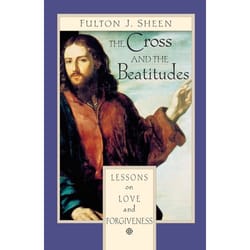Dear Theophilus,
I recently finished reading Blessed Fulton Sheen’s The Cross and the Beatitudes. What the eloquent archbishop does in this short work is demonstrate the links between the Beatitudes of the Sermon on the Mount and the final phrases Christ uttered from his Cross on Calvary. Once again I have found that Blessed Fulton Sheen’s wisdom has uncovered the fullness of the Christ’s narrative for me by showing the great symmetry of the Gospel that once it is pointed out, becomes so crystal clear.
Archbishop Sheen dedicates each of the book’s seven chapters to showing the parallels between the beginning of Christ’s ministry in the Beatitudes and its fulfillment on the Cross:
Blessed are the meek: for they shall possess the land.
Father, forgive them, for they know not what they do.
Blessed are the merciful: for they shall obtain mercy.
This day you shall be with me in paradise.
Blessed are the clean of heart: for they shall see God.
(Son) behold your mother, Woman, behold your son.
Blessed are the poor in spirit, for theirs is the kingdom of heaven.
My God, my God, why have you forsaken me?
Blessed are they that hunger and thirst after justice: for they shall have their fill.
I thirst.
Blessed are the peacemakers: for they shall be called the children of God.
It is consummated.
Blessed are they that mourn; for they shall be comforted.
Father, into your hands, I commend my spirit.
In fact, Archbishop Sheen begins each chapter in the same way. The opening paragraph reads: Our Blessed Lord began his public life on the Mount of the Beatitudes by preaching: “(insert the beatitude here).” He finished his public life on the Hill of Calvary by practicing (this beatitude): “(insert words from the Cross here).” The second paragraph then outlines how Christ’s teaching is so at odds with the world and the third paragraph reminds us just how challenging it is to follow Christ’s teaching.
The amazing part of The Cross and the Beatitudes is that the work written in 1937 transcends the decades and is applicable to our society today. Aside from a few lines about the need to battle the atheistic evil of communism in the first chapter, the reader will immediately recognize today’s world in Blessed Fulton Sheen’s descriptions. For example in the chapter on The Lesson of Poverty he writes:
Both the Beatitude and the Word are foreign to the spirit of the world. Modern society is what might be characterized as acquisitive, for its primary concern is to acquire, to own, to possess; its aristocracy is not one of blood or virtue, but of money; it judges worth not by righteousness but in terms of possessions.
As my wife rightly pointed out – these are very high standards to try to live up to. As Sheen remarks time and again throughout the book – it’s not going to be easy, and you will be shunned by society for trying to live by these standards. In his final chapter, Blessed Fulton Sheen points asks his readers which road they would like to take: The first road is full of thorns, but if we traverse it far enough, we find it ends in a bed of roses; the other road is filled with roses, but if we traverse it far enough, it ends in a bed of thorns.
When you feel your path is nothing but thorns, remember that Christ was crowned with thorns. When people mock you because you stand for your principles, remember the throngs that jeered Christ at the foot of his Cross.

No comments:
Post a Comment